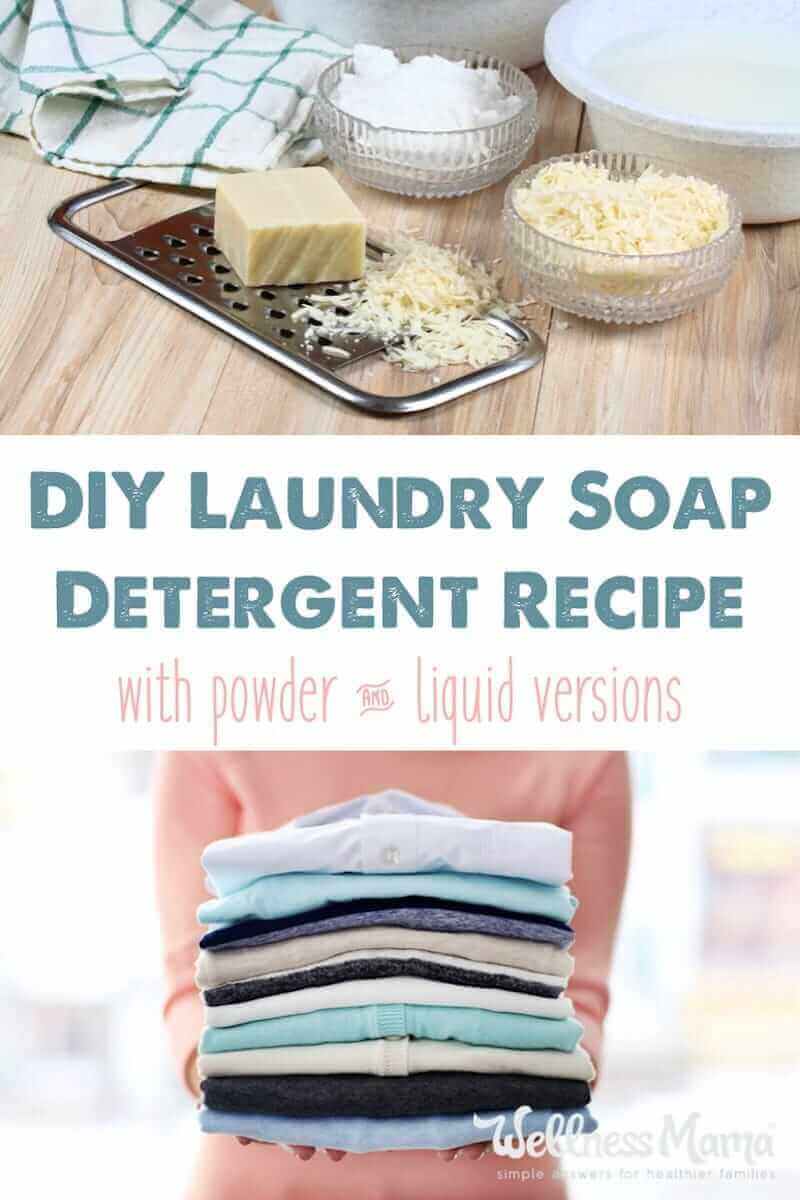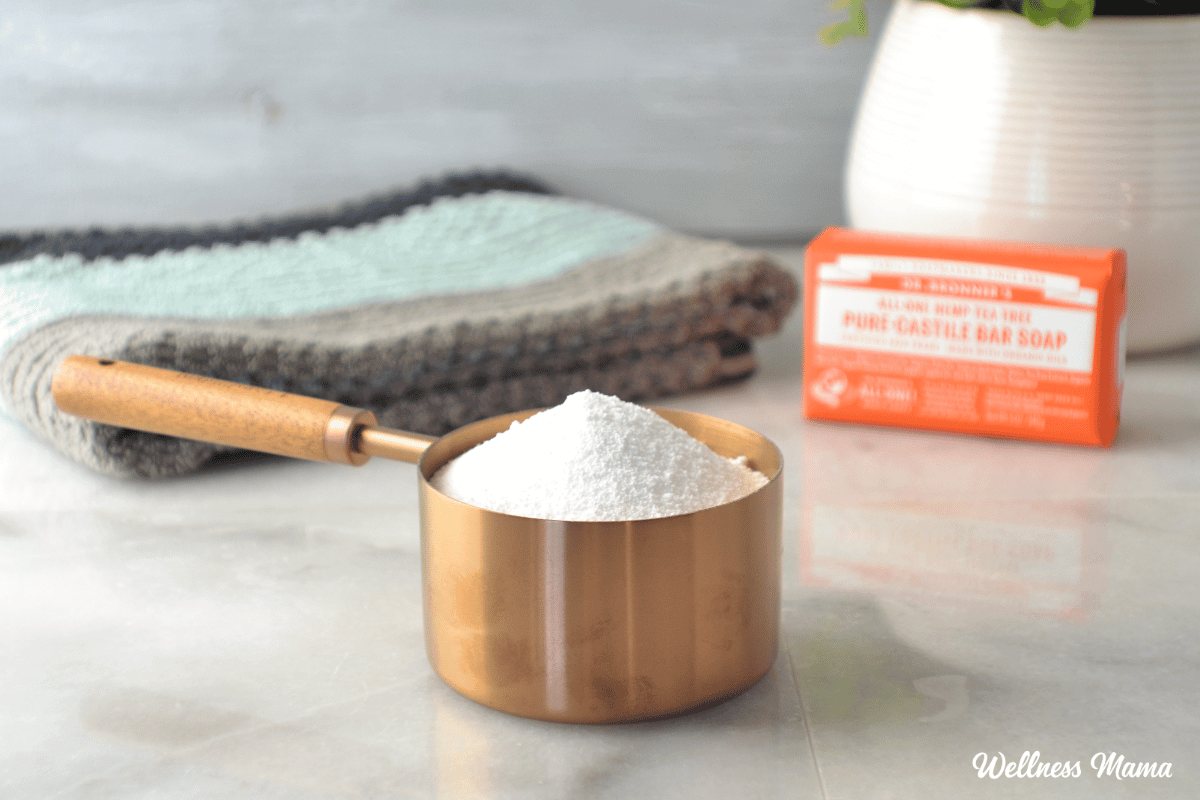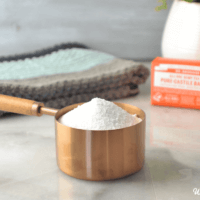Homemade laundry detergent is one of the easiest parts of a transition to natural living. This natural laundry soap recipe is a great way to save money and is incredibly easy to make. It almost makes tackling that pile of dirty laundry feel like less of a chore!
Have an HE machine? Check out this HE article that addresses high efficiency washers and borax safety. The recipe is the same as the one below, but be sure to check with your washer manual before using a new laundry soap if you have any concerns.
Why Switch to Natural Laundry Soap?
Commercial detergent is loaded with chemicals like sulfates, fragrances, dyes and more. Many brands contain things like petroleum distillates, which are linked to cancer and lung disease. Fragrances in these detergents are made with a mix of harmful chemicals. (This is also why I make my own linen spray.)
Luckily, making your own laundry soap is an easy and fast process! You only need three basic ingredients to make either a powdered or liquid laundry soap. These ingredients are available at most stores, including Walmart, Target, Amazon, etc.
DIY Laundry Soap Ingredients
- Washing Soda
- Borax
- Bar Soap (Dr. Bronner’s, Ivory, or homemade laundry soap)
You can usually find a box of borax and some washing soda at your local grocery store in the laundry aisle. Sometimes I like to add a few tablespoons of baking soda to help freshen clothes. Natural bar soaps are in the health, beauty, or organic sections of the store, or online.
Natural Laundry Soap Recipe
Equipment
- Food processor (or cheese grater)
Materials
- 1 bar soap (such as Dr. Bronner’s Pure Castile Bar Soap or homemade coconut oil soap)
- 1 cup washing soda
- 1 cup borax
Instructions
- Grate the bar of soap or pulse it in a food processor until finely ground.
- In a large bowl, mix together the grated soap, washing soda, and borax.
- Store in a sealed container like a glass jar
- To use: add 2 tablespoons to ¼ cup of soap per load of laundry.
Notes
Wonder What’s in These Ingredients?
Borax is a naturally occurring mineral made of sodium, boron, oxygen, and water. It’s in most of the natural soaps available now but it’s much less expensive to make your own homemade laundry detergent. Some people have concerns about borax but here’s why I feel comfortable using it, especially in my laundry room.
Washing Soda or super washing soda (sodium carbonate) is made from common salt and limestone or found as natural deposits. It’s not the same as baking soda (sodium bicarbonate), but you can make washing soda from baking soda. Here are some other great household uses for washing soda.
Dr. Bronner’s soaps are fair trade and made with vegetable castile soap and pure organic essential oils. Some DIY laundry recipes call for a bar of Fels Naptha soap or Zote but I’m not a fan of the ingredients. After years of using Dr. Bronners, I switched to this homemade laundry soap in my DIY recipe.
These tallow based soap flakes designed for DIY laundry detergent also work well.
How to Make Liquid Laundry Soap
- Grate one bar of soap with a cheese grater or food processor.
- Put the grated soap in a pan with 2 quarts of hot water and gradually heat. Stir constantly until the soap is completely dissolved.
- Put 4.5 gallons of really hot water in a 5-gallon bucket. These are often available for free in bakeries at grocery stores, just ask them. Stir in 2 cups of borax and 2 cups of washing soda until completely dissolved.
- Pour the soap mixture into the 5-gallon bucket and stir well.
- Cover and leave overnight.
- Shake or stir until smooth and pour into gallon jars or other containers.
- Use 1/2 to 1 cup per load of laundry.
Not only is it easy, but you can save money too!
A Note About Soap vs. Detergent
As mentioned above, there’s a chemical difference between soap and detergent. Conventional laundry detergents are formulated to work specifically with washing machines. They can work even in cold water or with hard water.
Many soaps are designed for the skin and aren’t as strong. Some sources suggest that over time, natural soaps can leave buildup in washers.
I’ve found that while this recipe works well for me, it isn’t suitable for all water types and washer types. If you’ve used natural laundry soap and experienced clothes getting dingy, this may be the reason. Newer HE washer top load machines and especially the front load washers are notorious for not getting clothes as clean as old-school versions. They can also be more temperamental when it comes to which laundry soap they like.
I’ve found one natural detergent that works brilliantly and can be used alone or in combination with homemade laundry soaps like this one. I often add 2-3 Tablespoons of Dr. Bronners Sal Suds per load as a natural detergent. Sal Suds gets out odors and is still a natural product (though technically a detergent/surfactant and not a soap). It even works as a natural stain remover.
Don’t Want to Make it?
I used to always make my own detergent but now I’ll usually buy a natural brand since there are some really healthy options. Here are some of my favorites:
- Truly Free– Just a warning… after you try this laundry soap, you may never want to go back to DIY. This is the best smelling non-toxic laundry detergent I’ve tried and it works well on tough stains and dirt. Similar to my favorite all-purpose cleaner, a huge bonus is their eco-friendly approach. The detergent comes concentrated in a small refill packet which you add to warm water in the provided bottle. Super smart!
- 2 tablespoons Sal Suds + 1/4 cup baking soda or washing soda (highly effective and super simple!) You can also use Sal Suds to make homemade dish soap.
- Emma Eco Me Detergent – Also rated well by the EWG and comes in yummy scents.
- Planet Natural Detergent – Relatively eco-friendly and cost-effective.
The most frugal option is to make your own, but these natural alternatives are a good choice if you aren’t able to make it (or don’t want to).
Other Natural DIY Laundry Products and Tips
Instead of toxic fabric softeners, try using vinegar! Simply pour a cup of white vinegar in during the rinse cycle or in the washer dispenser.
Some people report good results with adding Epsom salt to their washing machine during the wash cycle. It can help soften hard water and reduce soap buildup for cleaner clothes. Here are some more DIY laundry recipes to add to your laundry cabinet.
- Natural bleach alternatives
- How to remove stains from clothes with ingredients like hydrogen peroxide.
- Homemade Oxiclean stain remover
Have you tried making your own laundry detergent? How did it work for you?





Leave a Reply